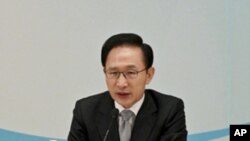South Korea's president is demanding that North Korea dismantle its nuclear program in 2011 and he says resuming the six-party talks are the only way forward.
President Lee Myung-bak has previously insisted that Pyongyang show it is serious about nuclear disarmament before it is allowed to resume the talks with China, Russia, Japan, the United States and the two Koreas. But it has been a tense 2010 on the Korean peninsula ever since March, when a South Korea war ship exploded, killing 46 seamen. The North denied any involvement, but South Korea, backed by international investigators, blamed Pyongyang. Last month, a North Korean artillery barrage on South Korea's Yeongpyeong island killed four people, and prompted a series of massive military exercises involving South Korean and U.S. forces.
VOA spoke with Peter Beck, a long-time North Korea observer at the Washington-based Council on Foreign Relations.
Is President Lee Myung-bak changing his approach with North Korea by abandoning his demand that they first demonstrate they are dismantling their nuclear program before the six-party talks can resume?
"I think President Lee has been falsely painted as a hardliner when it comes to North Korea. I've known him from his days in self-imposed exile in the United States and as mayor and he is a businessman. He is a pragmatist. He is not a hardliner. I think this just shows his pragmatic side. At the end of the day, we don't have any appealing options other than to negotiate with North Korea and I think it's an acknowledgment of that reality. It is coming sooner than I would've expected given that the South has now suffered two sucker-punches by North Korea. But there really is no choice but to talk to the North."
Is the South truly ready to sit down and talk with the North after last month's artillery attack on Yeongpyeong island that killed four people and the sinking of the South Korean Navy ship in March that killed 46 sailors?
"There has to be a certain amount of outrage because what North Korea did was outrageous. But once people cool down, I think there is a realization that waiting for someone to di, or waiting for a change in North Korea is not a policy, it's wishful thinking. And I think he [Lee Myung-bak] is the first to recognize that. We've seen that South Korea is taking a resolute stand and trying to beef up its military to try to do better when the next sucker-punch comes. North Korea has learned that the only way they have a chance of prevailing in a conflict is if they have the element of surprise. They will try to do that again and the bottom line is it doesn't matter if they lose troops in response. So conflict is a no-win situation for South Korea. Even if they kill hundreds or thousands of North Koreans, it's not going to solve the North Korea question."
The North's political leadership says it is focused on boosting its economy in the coming year. You've written about how North Korea's command economy collapsed in the 1990's and has been replaced by hundreds of informal markets where people sell home grown vegetables, house-hold items and Chinese consumer products. Is the North Korean leadership taking a lesson from China, where the government has allowed market forces to work?
"I think the markets are taking root in North Korea in spite of the government. Although there are forces at play, market forces and technology that are seeping into North Korea, I don't think North Korea is ready to take China's path. But millions of North Koreans have taken matters into their own hands and have recognized if they wait for food to come from the state, they will starve. So even with the disastrous currency reforms that North Korea launched a year ago, markets seem to have recovered, based on the reports of visitors. "




